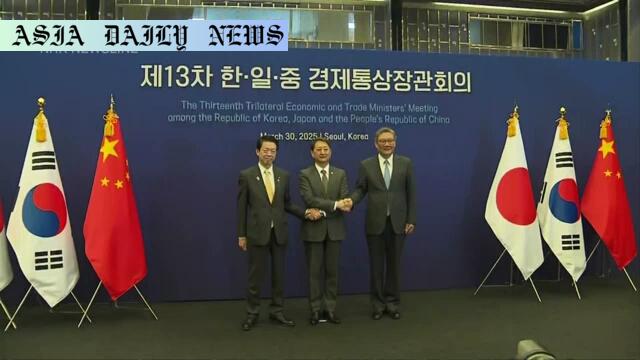Trilateral Trade: Japan, China, and South Korea agree to promote WTO-rule-based free trade and accelerate FTA negotiations.

Trilateral Trade Triumph: A Positive Shift in Global Economy
Introduction: The Significance of Unity in Trade
In an increasingly globalized world where economic instability and protectionist policies have become the norm, fostering partnerships and upholding international trade rules isn’t just critical—it’s essential. For the first time in five years, Japan, China, and South Korea convened for trilateral trade talks in Seoul to address challenges and identify opportunities for collaboration. With Asia being a significant economic force globally, such cooperation has the potential for profound implications on trade, investments, and overall global economic architecture.
The Meeting: A Commitment to Multilateralism
Japan’s Economy, Trade, and Industry Minister, Muto Yoji, alongside his counterparts from China and South Korea, emphasized multilateral cooperation centered on the World Trade Organization’s principles. Representing nations that collectively account for roughly 25% of the global GDP, these ministers acknowledged their collective responsibility as economic leaders to drive a rules-based trade order. In light of shifting global power dynamics, such initiatives not only ensure economic growth but also promote stability at a time when international trade may face turbulence due to rising unilateralism.
Accelerating the Free Trade Agreement Discussions
A significant outcome of the meeting was the agreement to expedite the negotiation of a much-anticipated Free Trade Agreement (FTA) among the three nations. FTA talks first began in 2012, but little progress has been made over the years due to geopolitical friction and economic concerns. However, faced with global crises and the need for stronger regional integration, the ministers pledged to bring greater momentum to discussions. Such an agreement, if realized, has the potential to enhance regional trade, increase economic interdependence, and counterbalance protectionist trade measures imposed by other nations.
Responding to Global Trade Challenges
Global trade has faced numerous disruptions recently, from the COVID-19 pandemic to geopolitical economic conflicts. What stood out in this trilateral meeting was the implicit reference to policies implemented by the United States, such as tariff hikes during Donald Trump’s administration, which have created ripples across the global trade framework. While the official statement didn’t explicitly critique such measures, the ministers’ shared focus on adherence to WTO principles underscores their aim to counter the chaos caused by protectionist approaches. Additionally, their commitment to multilateral engagement emphasizes how collaboration can address shared economic uncertainties.
Asia as the World’s Economic Powerhouse
If there’s one undeniable fact stemming from this meeting, it’s how crucial Asia—particularly these three nations—is to the global economy. Together, Japan, China, and South Korea form the backbone of global trade, and their ability to unite around shared goals can shape the world’s economic future. Beyond trade, such partnerships encourage technological innovation, green energy transitions, and geopolitical stability. Their recent meeting also signals a renewed willingness to set aside disputes and focus on cooperative growth, benefiting not just their economies but a multitude of countries connected through trade.
The Path Forward: A New Hope for Global Economic Order
The revival of trilateral trade talks is indeed a beacon of optimism in an era of pessimism concerning globalization. By prioritizing the rule of international law, emphasizing collaboration, and addressing regional economic challenges, Japan, China, and South Korea have set an example for others to follow. However, achieving meaningful results—like concluding an FTA—requires sustained effort, mutual respect, and overcoming geopolitical disagreements. The world will be watching as these nations, bound by shared economic interests, work toward bringing a new-age collaborative framework to life.
Commentary
Commentary on Trilateral Trade Talks
Pioneering a New Era of Economic Cooperation
The recent trilateral trade meeting among Japan, China, and South Korea reaffirms the necessity of unity in these turbulent times. Such discussions gain prominence considering the rapid pace at which the global economic order fluctuates due to protectionist policies and rising geopolitical disputes. For these three countries—a collective global economic powerhouse—to come together after a five-year gap signals not only a renewed sense of purpose but also their acknowledgment of shared responsibilities toward global economic growth.
Keeping Multilateralism Alive Amid Growing Barriers
With multilateralism under threat and economic nationalism on the rise, these discussions are a refreshing shift that underpin the unwavering importance of collaborative partnerships. The unwavering commitment to WTO rules indicates a desire to maintain stability—one that transcends domestic economic policies or regional biases. It also serves as a reminder that shared economic resilience is vital in weathering disruptions in global trade.
Challenges and Opportunities in Driving Regional Integration
While the prospects of strengthening trade relations are promising, they are not devoid of challenges. Historical tensions and unresolved geopolitical disputes between the nations have, in the past, stifled progress on initiatives such as a Free Trade Agreement. Their ability to overcome these barriers will determine the pace and effectiveness of such collaborative goals. Nevertheless, their commitment to revive FTA discussions signals a recognition of the immense economic potential and benefits this partnership could deliver.
Conclusion: A Path Toward Global Relevance
These trilateral trade talks herald a return of optimism for those who believe in the merits of global cooperation. If Japan, China, and South Korea can set aside past differences and focus on their shared economic goals, they are positioned to greatly influence not just Asia’s economic future but the global trade landscape. Their convergence on WTO-based rules should also inspire other larger economies to work towards mitigating protectionist practices and fostering global growth.


